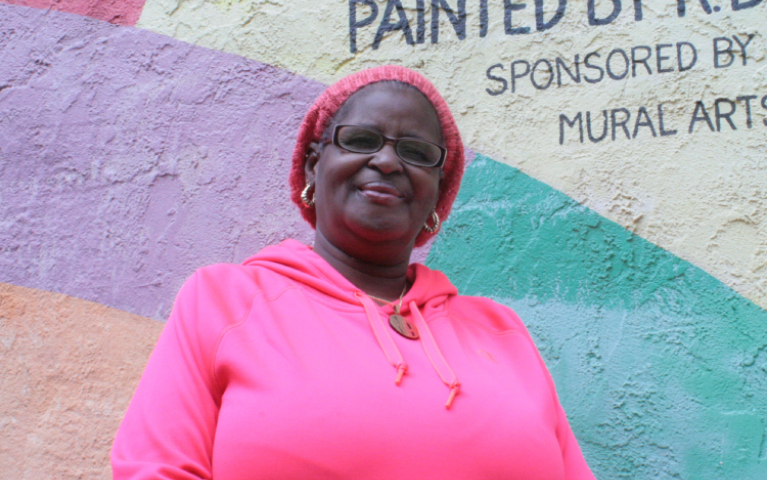Peer to Peer Success: Zarah Teachy's Story

Anabel Genevitz is a student at Arcadia University, and volunteers with Project HOME's Education and Advocacy Department.
You might think that Project HOME’s success in empowering men and women to break the cycle of chronic homelessness is due to very competent and committed staff. And that’s certainly a large part of it. But another very important factor, one that has been growing tremendously in the past few years, is the role that residents play in supporting each other.
Several of our residents have received formal training to become Certified Peer Specialists. The Certified Peer Specialist program originated out of the City of Philadelphia’s Department of Behavioral Health, in an effort to encourage consumers of mental health and addictions services to own their recovery, rather than simply be “treated.” The new model, called Recovery Transformation, recognizes that recovery from behavioral health issues, whether addictions or mental illness, is an ongoing and holistic process, and that persons living with behavioral health issues don’t simply have to manage their disease but can live full and productive lives. A growing peer support culture in the mental health field understands that mental health consumers are often the best advocates and supports for each other.
The Recovery Transformation model is very similar to the core values and holistic philosophy of Project HOME. So it made sense that we would develop a Peer Case Aide program, which gives an opportunity for our residents and alumni to share their gifts with the rest of us. The program hires residents and alumni who are certified peer specialists to be part of our case management process, making their own life experience a source of empowerment for others. We are finding that the program is producing positive results for everyone involved.
Zarah Teachy arrived at Project HOME in 1983, having met Sister Mary Scullion at the House of Correction years beforehand. Drug addiction had gotten Zarah to a place she was painfully unhappy with: She had no home and no way to take care of her young son. Although Zarah’s journey and struggle with addiction would not end in 1983, her involvement with Project HOME would prove an essential component to her recovery.
In 2007, while living at Project HOME, Zarah received her high school diploma. At that time, she decided she could use her experience to help others. She began training as a Certified Peer Specialist. Upon completing the program, she returned to Project HOME to share her talents and experience with residents at several of our sites: Connelly House (formerly In Community), St. Elizabeth’s, the Women’s Respite, and St. Columba’s. She is part of our staff now, as a Peer Case Aide, which allows her to use her years of hands-on experience in order to enhance the recovery process for Project HOME’s residents.
Nicole Paul, our staff person overseeing both the Peer Case Aide and Alumni programs, initially referred Zarah as an excellent candidate for the position. Nicole speaks highly of the success of the program, adding that she often asks Zarah and her other Peer Case Aides for advice on dealing with a certain resident or situation.
The Peer Case Aide position has worked mutually well for both Zarah and her residents. “Working with alumni has allowed me to open myself to others,” Zarah says. She adds, “I feel I found my niche at Project HOME”
When asked about a typical day on the job, Zarah responds that being a Peer Case Aide can be extremely varied. “I can help them with anything from getting to a doctor’s appointment, to obtaining furniture for their rooms, to helping them cope with their addictions.” Although the job of Peer Case Aide often reflects a practical nature, she still focused on the main component of recovery: the concept of family love that she insists keeps the gears at Project HOME turning. Her work as a Peer Case Aide has inspired her to hopefully become a case manager one day.
Project HOME is not the only organization to reap the benefits of Zarah’s openness and lovingness. Zarah also coordinates an addictions group for COMHAR – Community Organization for Mental Health and Retardation. Her group meets for two hours every Tuesday, but the meetings always take on a friendly tone. She reports that bingo night remains by far most popular, with as many as ten people joining in the festivities. The group also takes trips to popular Philadelphia hangouts, such as LOVE Park and the Reading Terminal Market. The trips promote a sense of community, she says – they are never simply doing, but always talking and connecting with their peers.
The Certified Peer Specialist model and Project HOME’s extension of the model creates a mutually beneficial system of recovery as well as a stronger sense of community. Zarah’s involvement encourages her along her own journey of recovery, and reinforces the success she has already experienced.